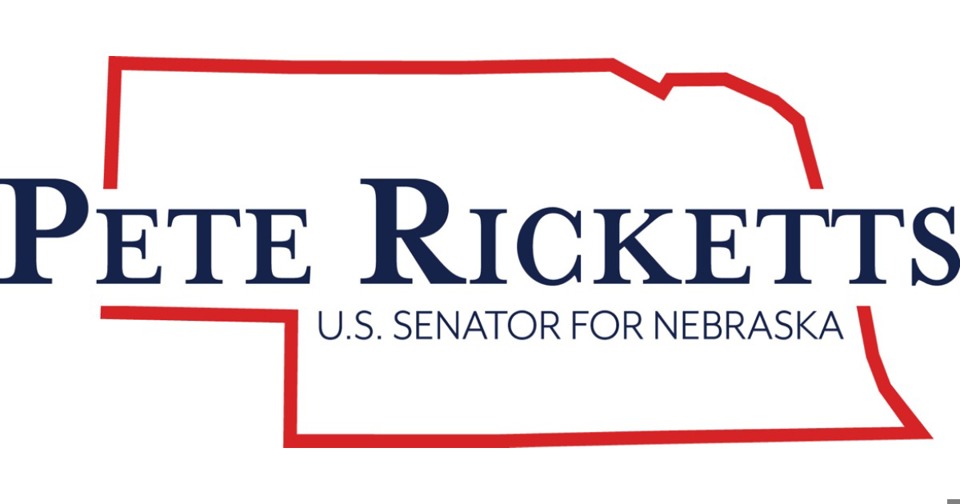Ricketts Introduces Five Bills to Combat Chinese Communist Party Influence

WASHINGTON, D.C. – Today, U.S. Senator Pete Ricketts (R-NE), a member of the Senate Committee on Foreign Relations, introduced five pieces of legislation aimed at combatting the influence of the Chinese Communist Party (CCP) in America’s agriculture and financial sectors.
“The CCP is the single greatest threat to America’s national security and financial independence,” said Senator Ricketts. “A CCP-led world would mean coercion instead of choice, tyranny instead of liberty, and dictatorship instead of democracy. The only way to combat this threat is with a strong, strategic, all-of-government approach. These bills move us closer to that.”
The Securing American Agriculture Act bolsters and protects our domestic food and agriculture supply chains and reduces America’s reliance on foreign adversaries.
The Protecting Endowments from our Adversaries Act disincentivizes endowments from investing in adversarial entities flagged by the U.S. Government as threatening to our national security.
The No Capital Gains Allowance for American Adversaries Act eliminates tax breaks for investments made in companies based in China, Russia, Iran, North Korea, and Belarus.
The PRC Military and Human Rights Capital Markets Sanctions Act prevents Wall Street firms from using Americans’ investment dollars to effectively underwrite the CCP’s human rights abuses and aggression.
The No China in Index Funds Act prevents index mutual funds from holding Chinese stocks.
The bills were first covered by Fox News here.
BACKGROUND:
Securing American Agriculture Act – The PRC’s strategic control over crucial sectors of our food and agricultural supply chain poses a serious national security threat. In recent years, the PRC gained significant market share in the production of essential agricultural inputs like vitamins, veterinary pharmaceuticals, and crop protection tools. China now controls over 90% of vitamin C and vitamin B6 production and up to 85% of amino acids used in animal feed.
Losing access to these key inputs could drastically reduce agricultural productivity, increase food prices, and undermine domestic food security. A University of Wisconsin-Whitewater study found that, if left unchecked, the PRC’s domination of the amino acids market would destroy 30,000 U.S. jobs and reduce economic activity by $15 billion per year. The Securing American Agriculture Act bolsters and protects our food production supply chain.
Specifically, the bipartisan bill:
Requires the U.S. Department of Agriculture, in conjunction with the U.S. Trade Representative and the Department of Commerce, to conduct an annual threat assessment of critical food and agricultural supply chains.
Requires the Secretary of Agriculture to provide recommendations to mitigate potential threats from the PRC and for legislative and regulatory actions to reduce barriers to domestic critical input production.
U.S. Representatives Ashley Hinson (R-IA-02) and Elissa Slotkin (D-MI-07) have introduced companion legislation in the House. The Senate bill is co-sponsored by Senators Tammy Baldwin (D-WI), Mike Braun (R-IN), John Barrasso (R-WY), John Cornyn (R-TX), Shelley Moore Capito (R-WV), Deb Fischer (R-NE), Cynthia Lummis (R-WY), Mike Crapo (R-ID), Jim Risch (R-ID), Rick Scott (R-FL), and Eric Schmitt (R-MI).
Protecting Endowments from Our Adversaries Act (PEOAA) – U.S. University endowment dollars have helped fund technology behind the CCP’s surveillance of Uyghur Muslims in China. Many endowment fund portfolios own Chinese stocks listed on American exchanges, either directly or indirectly. Tax-advantaged endowment dollars are supposed to be used to lower tuition costs and improve education, not to fund our adversaries.
Specifically, the bill:
Imposes a 50% excise tax on initial investments in adversarial entities on the Entity List, Military End User List, Unverified List, or FCC Covered List.
Imposes a 100% excise tax on the realized gains derived from listed investments one year after an entity is listed. Applies to private college and university endowments over $1 billion.
U.S. Representative Greg Murphy (R-NC-3) has introduced companion legislation in the House. The Senate bill is co-sponsored by Senator Tom Cotton (R-AR) And Deb Fischer (R-NE).
No Capital Gains Allowance for American Adversaries Act – According to a comparative analysis of capital gains tax rates by the Law Library of Congress, many countries have investment incentives not applicable to some foreign investments. For example, China provides investment incentives through its tax code, but foreign investments are eligible only with the pre-approval of the Chinese government. The No Capital Gains Allowance for American Adversaries Act stops subsidizing our adversaries’ investments in the United States.
Specifically, the bipartisan bill:
Eliminates the capital gains tax break for investments in companies based in China, Russia, Belarus, Iran, and North Korea.
Eliminates a related tax break, the “step-up in basis” at death, for investments in such companies.
Requires disclosure to the Securities and Exchange Commission (SEC) that no tax breaks are available for these stocks.
U.S. Representatives Brad Sherman (D-CA-32) and Victoria Spartz (R-IN-05) have introduced companion legislation in the House.
People’s Republic of China (PRC) Military and Human Rights Capital Markets Sanctions Act – A recent report identified 144 Chinese companies, or their affiliates, whose practices were so adverse to U.S. interests that it is illegal for Americans to buy their products. Most of these companies have been found to violate human rights. Others play an integral role in the CCP’s military-industrial complex. While buying the products of these companies is illegal, it is still legal to buy their stock. The PRC Military and Human Rights Capital Markets Sanctions Act fixes this problem.
Specifically, the bipartisan bill:
Prohibits Americans from purchasing, selling, or holding publicly-traded securities of companies that appear on sanctions lists or have an affiliate on the sanctions list.
Prohibits Americans from purchasing, selling, or holding publicly-traded securities that are derivatives of securities issued by a sanctioned company.
Prohibits Americans from purchasing, selling, or holding securities that provides investment exposure to a publicly-traded security issued by a sanctioned company or affiliate.
Requires divestment from the prohibited securities within 180 days.
U.S. Representatives Brad Sherman (D-CA-32) and Victoria Spartz (R-IN-05) have introduced companion legislation in the House.
No China in Index Funds Act – Index mutual funds minimize their expenses by simply investing in all the companies in a certain market sector, without looking closely at the individual companies. There are unique difficulties in evaluating the risks of investing in Chinese companies. Americans should not invest in these companies without carefully evaluating the risk. The No China in Index Funds Act will keep these hard-to-evaluate Chinese stocks out of index mutual funds.
Specifically, the bipartisan bill:
Prohibits index funds from investing in Chinese companies.
Requires index funds to divest from such investments within 180 days.
U.S. Representatives Brad Sherman (D-CA-32) and Victoria Spartz (R-IN-05) have introduced companion legislation in the House.
